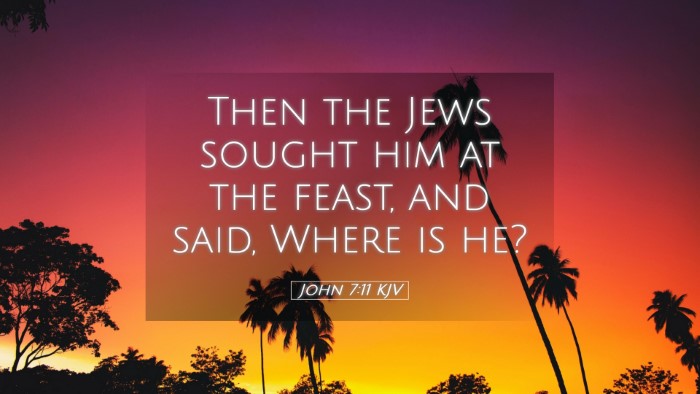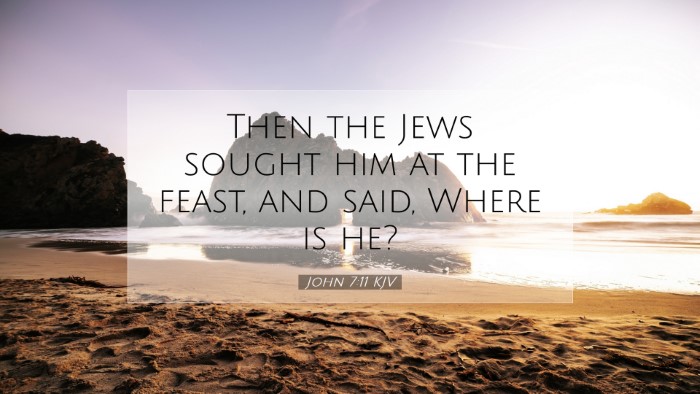Commentary on John 7:11
In John 7:11, we find an essential moment in the narrative of Jesus’ ministry which reveals the tensions surrounding His identity and mission. This verse states, “Then the Jews sought Him at the feast, and said, Where is He?” This seemingly simple inquiry opens layers of theological and historical insight, worthy of exploration through the lenses of esteemed biblical commentators.
Contextual Setting
This verse arises during the Feast of Tabernacles, a significant Jewish festival that symbolized God’s provision during the Exodus and emphasized the importance of dwelling with God. The presence of Jesus amidst this festive backdrop is critical, as it signifies God’s ultimate provision through the Messiah.
Insights from Matthew Henry
Matthew Henry emphasizes the curiosity and skepticism of the Jewish leaders and the populace regarding Jesus. He notes:
- Seeking Jesus: The Jews' inquiry, "Where is He?", reflects their deep-seated interest in His whereabouts but also a quest to challenge His authority. The context indicates a sense of urgency as they sought to confront or possibly validate their opinions about Him.
- Divine Timing: Henry suggests that this moment harbors divine significance; Jesus is aware that the timing of His revelation should align with God's purposes. His presence at the feast is deliberate, showcasing the intersection of His earthly ministry with Jewish tradition.
Insights from Albert Barnes
Albert Barnes offers a detailed exposition on the implications of this verse:
- Public Sentiment: Barnes underscores the mixed reactions to Jesus’ teachings; the multitude was intrigued yet divided about His true nature. The question posed by the Jews captures a broader societal perplexity regarding Jesus' claims versus their expectations.
- Theological Implications: He points out that this inquiry not only seeks physical location but is symbolic of a deeper spiritual quest. Jesus embodies the ultimate fulfillment of the feast, and their failure to recognize Him showcases the spiritual blindness prevalent among the leaders.
Insights from Adam Clarke
Adam Clarke provides a thorough analysis of the cultural and historical context of this passage:
- The Feast's Significance: Clarke notes that during the Feast of Tabernacles, speculation about the Messiah's identity was at an all-time high. The Jews' desire to seek out Jesus signifies a pivotal moment where expectation meets revelation.
- Contrasting Perspectives: Clarke highlights that the inquiry, "Where is He?" underlines a stark contrast between the crowds' curiosity and the religious authorities' hostility. This duality represents the tension between the divine and human efforts to understand God's plan.
Theological Reflections
Combining insights from these commentaries, we discern profound truths about the nature of Christ and the responses to Him:
- Jesus as the Center: The questioning of Jesus' presence during the feast establishes Him at the center of God's redemptive plan. His eventual arrival at the festival serves both as a fulfillment of Jewish expectation and a challenge to their religious status quo.
- Human Inquiry and Divine Revelation: The search for Jesus can be seen as emblematic of humanity's incessant quest for meaning and truth, which ultimately finds its fulfillment in Him. This aligns with the Johannine theme of Jesus as the Logos—the Word through whom all things are made and understood.
- Spiritual Awareness: The reactions of the people and leaders highlight a recurring theme in the Gospel of John—the tension between spiritual enlightenment and ignorance. The question “Where is He?” serves as a spiritual diagnostic, inviting readers to reflect on their own understanding of Jesus.
Conclusion
In summary, John 7:11 invites a deep and thoughtful examination of Jesus' role amid the festivities of the Feast of Tabernacles. The inquiries from the Jews set the stage for understanding the complexities of faith, expectation, and realization. As believers reflect on this verse, they are reminded of the ongoing dialogue between divine purpose and human search, a reminder that seeking Christ is both a pressing need and a profound privilege.


